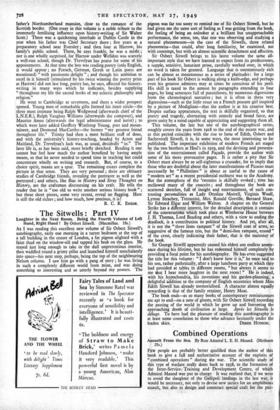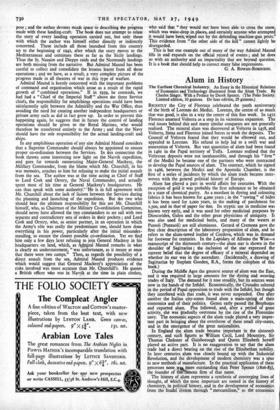Combined Operations
FEW people are probably better qualified than the author of this book to give a full and authoritative account of the exploits of "combined operations " during the war. The scientific study of this type of warfare really dates back to 1938, to the formation of the Inter-Service , Training and Development Centre, of which Admiral Maund was put in charge. It was realised that, if we were to avoid the slaughter of the Gallipoli landings in the last war, it would be necessary, not only to devise new tactics for an amphibious assault, but also to design and construct special craft for the pur- pose ; and the author devotes much space to describing the progress made with these landing-craft. The book does not attempt to relate the story of every landing operation carried out, but only those with which the author was himself either directly or indirectly concerned. These include all those launched from this country up to the beginning of 1942, after which the story moves to the Mediterranean and continues there as far as the Sicily landings. Thus the St. Nazaire and Dieppe raids and the Normandy landings are both missing from the narrative. But Admiral Maund has been careful to collect and consolidate the lessons learnt from all these operations ; and we have, as a result, a very complete picture of the progress made in all theatres of war in this type of warfare.
Admiral Maund is keenly concerned with the important problems of command and organisation which arose as a result of the rapid growth of " combined operations." If in 1939, he contends, we had had a "Chief of the Imperial Staff" above the three Service chiefs, the responsibility for amphibious operations could have been satisfactorily split between the Admiriity and the War Office, thus avoiding the need for creating another independent headquarters or private army such as did in fact grow up. In order to prevent this happening again, he suggests that in future the control of landing operations should be given to the Royal Marines, who would therefore be transferred entirely to the Army; that the Navy should have the sole responsibility for the actual landing-craft and ships.
In any amphibious operation of any size Admiral Maund considers that a Supreme Commander should always be appointed to ensure proper co-ordination between the Services. In this connection the book throws some interesting new light on the Narvik expedition, and goes far towards exonerating Major-General Mackesy, the Military Commander, from the blame which Mr. Churchill, in his war memoirs, attaches to him for refusing to make the initial assault from the sea. The author was at the time acting as Chief of Staff to Lord Cork and Orrery, the Naval Commander, and actually spent most of his time at General Mackesy's headquarters. He can thus speak with some authority:" He is in full agreement with Mr. Churchill about the lack of liaison between the Services during the planning and launching of the expedition. But the two who should bear the ultimate responsibility for this are Mr. Churchill himself, who, as Chairman of the Military Co-ordination Committee, should never have allowed the two commanders to set sail with two separate and contradictory sets of orders in their pockets ; and Lord Cork and Orrery, who, as senior partner, in an operation in which the Army's role was really the predominant one, should have done everything in his power, particularly after the initial misunder- standing, to ensure the closest possible co-ordination. Yet we find him only a few days leer refusing to join General Mackesy in his headquarters on land, which, as Admiral Maund remarks in what is clearly an understatement, " was Unfortunate, as it meant at once that there were two camps." Then, as regards the possibility of a direct assault from the sea, Admiral Maund produces evidence which would suggest that General Mackesy's appreciation of the risks involved was more accurate than Mr. Churchill's. He quotes. a British officer who was in Narvik at the time in plain clothes,
who said that " they would not have been able to cross the snow, which was waist-deep in places, and certainly anyone who attempted it would have been wiped out by the defending machine-gun posts." This evidence from " the other side of the hill " cannot lightly be disregarded.
This is but one example out of many of the way Admiral Maund fills in and expands on the official record of events ; and he does so with an authority and an impartiality that are beyond question. It is a book that should help to correct many false impressions.
G. A. RowAti-Roan.solst.







































 Previous page
Previous page